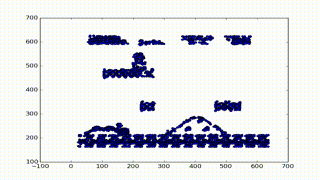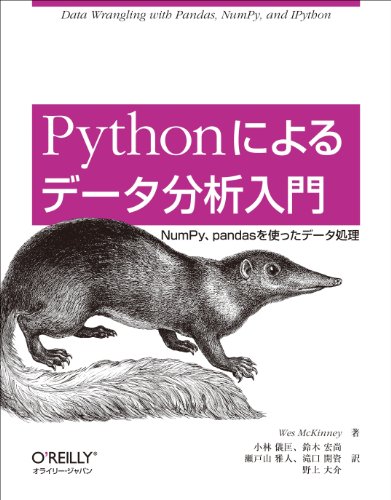pythonで散布図アニメーションを試してみた
最近pythonを触り始めたのですが、散布図をアニメーションさせる方法が分からなかったので調べてみました。
散布図はmatplotlib.plt.scatter(x,y)で作成する事が出来ます。
また、アニメーションをさせる方法は二通りのやり方があるようです。
- animation.ArtistAnimation
- 事前に用意してあるデータを描画
- animation.FuncAnimation
- 随時データを更新する
そこで円周上の点を一度ずつ移動させるというアニメーションをArtistAnimationとFuncAnimationの2つの方法で試してみました。 実行結果はどちらも次のようなものになります。

animation.ArtistAnimationの場合
事前にplt.scatterの戻り値をlistに保存しておき、animation.ArtistAnimationの第二引数に渡すと 描画する事が出来ました。
# -*- coding: UTF-8 -*- import math import matplotlib.pyplot as plt import matplotlib.animation as animation fig = plt.figure() # 360度分のデータを作成 ims = [] for i in range(360): rad = math.radians(i) im = plt.scatter(math.cos(rad), math.sin(rad)) ims.append([im]) # アニメーション作成 ani = animation.ArtistAnimation(fig, ims, interval=1, repeat_delay=1000) # 表示 plt.show()
animation.FuncAnimationの場合
更新のためのコールバック関数をanimation.FuncAnimationの第二引数に入れます。
また、コールバック関数の引数はfargs=(fig, im)のようにして渡す事が出来ます。
# -*- coding: UTF-8 -*- import math import matplotlib.pyplot as plt import matplotlib.animation as animation # 更新する内容 def _update_plot(i, fig, im): rad = math.radians(i) # 前回のフレーム内容を一旦削除 if len(im) > 0: im[0].remove() im.pop() im.append(plt.scatter(math.cos(rad), math.sin(rad))) fig = plt.figure() # グラフを中央に表示 ax = fig.add_subplot(1,1,1) # グラフの目盛範囲設定 ax.set_xlim([-1.5, 1.5]) ax.set_ylim([-1.5, 1.5]) im = [] # フレーム更新の際に前回のプロットを削除するために用意 # アニメーション作成 ani = animation.FuncAnimation(fig, _update_plot, fargs = (fig, im), frames = 360, interval = 1) # 表示 plt.show()
前フレームで描画された点を消しながらアニメーションさせる方法が分からず悩みましたが、plt.scatterの戻り値をremoveする事で解決出来ました。(本当はもっと良いやり方があるのかもしれません。)
おまけ
せっかくなので、某ゲームのプレイ動画からフレームを切り出して特徴量抽出したものをanimation.ArtistAnimationで表示してみました。
動画からフレームの切り出しはffmpegが便利です。
Macの場合は
brew install ffmpeg --with-libvorbis --with-libvpx --with-schroedinger
でffmpegを導入した後、
ffmpeg -i input.mpeg -f image2 frame%d.jpg
とする事でフレームの切り出しが出来ます。
また特徴量抽出にはopencvを使いました。詳しくはopencv, pythonで検索してみてください。
#coding: UTF-8 import cv2 from matplotlib import pyplot as plt import matplotlib.animation as animation fig = plt.figure() ims = [] for i in range(1, 100): name = "frame" + str(i) + ".jpg" img = cv2.imread(name,0) width, height = img.shape # 検出器の初期化 orb = cv2.FastFeatureDetector() # 特徴量の検出と出力用の計算 kp = orb.detect(img, None) x = [] y = [] for p in kp: x.append(p.pt[0]) y.append(height - p.pt[1]) # opencvの座標系は左上原点なので調整 im = plt.scatter(x, y) ims.append([im]) # 動画保存の準備 Writer = animation.writers['ffmpeg'] writer = Writer(fps=15, metadata=dict(artist='Me'), bitrate=1800) ani = animation.ArtistAnimation(fig, ims, interval=50, repeat_delay=1000) #動画として保存 ani.save('im.mp4', writer=writer) plt.show()
実行結果はこんな感じになります。

たったこれだけの行数でここまで出来るのは嬉しいですね。 さすがpython!

